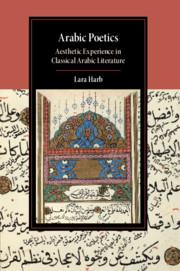Book contents
- Arabic Poetics
- Cambridge Studies in Islamic Civilization
- Arabic Poetics
- Copyright page
- Dedication
- Contents
- Preface
- Acknowledgments
- Note on Dates, Translations, Transliterations, and Names
- Introduction
- 1 Wonder
- 2 Wonder in Aristotelian Arabic Poetics
- 3 Discovery in Bayān
- 4 Metaphor and the Aesthetics of the Sign
- 5 Naẓm, Wonder, and the Inimitability of the Quran
- Epilogue
- Conclusion
- Bibliography
- Index
- Other Titles in the Series
Introduction
Published online by Cambridge University Press: 24 April 2020
- Arabic Poetics
- Cambridge Studies in Islamic Civilization
- Arabic Poetics
- Copyright page
- Dedication
- Contents
- Preface
- Acknowledgments
- Note on Dates, Translations, Transliterations, and Names
- Introduction
- 1 Wonder
- 2 Wonder in Aristotelian Arabic Poetics
- 3 Discovery in Bayān
- 4 Metaphor and the Aesthetics of the Sign
- 5 Naẓm, Wonder, and the Inimitability of the Quran
- Epilogue
- Conclusion
- Bibliography
- Index
- Other Titles in the Series
Summary
The Introduction presents the argument that aesthetic judgment in classical Arabic literary theory came to depend on the ability of poetry or eloquent speech to produce an experience of wonder in the listener. This experience of wonder is not merely a reaction of amazement and bedazzlement, but it also entails a process of discovery. After presenting an account of the nature of classical Arabic literary theory, its various approaches to literary assessment, its topics and historical development, the Introduction highlights that the main aspects of literary expression Arabic criticism was concerned with lay in rhetorical figures (badīʿ), simile (tashbīh), figurative speech (majāz), metaphor (istiʿāra), metonymy (kināya), and sentence construction (naẓm). It is in these aspects of linguistic expression that an aesthetic theory of wonder can be uncovered in the classical Arabic critical tradition, including in discussions of poetry proper, engagements with Aristotelian Poetics, and works on eloquence and the miraculousness (iʿjāz) of the Quran, culminating by the thirteenth century in the formalized study of eloquence in ʿilm al-balāgha (the science of eloquence).
- Type
- Chapter
- Information
- Arabic PoeticsAesthetic Experience in Classical Arabic Literature, pp. 1 - 24Publisher: Cambridge University PressPrint publication year: 2020



